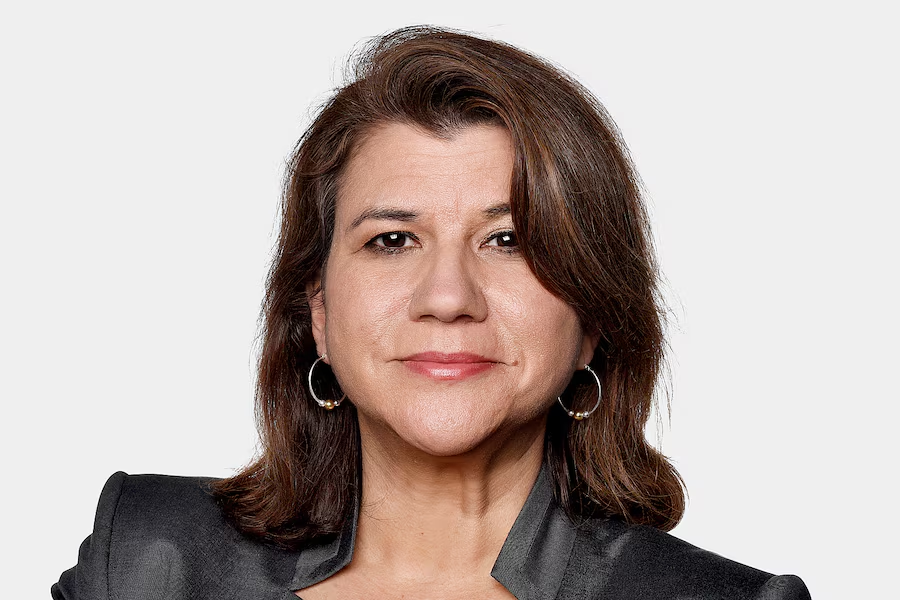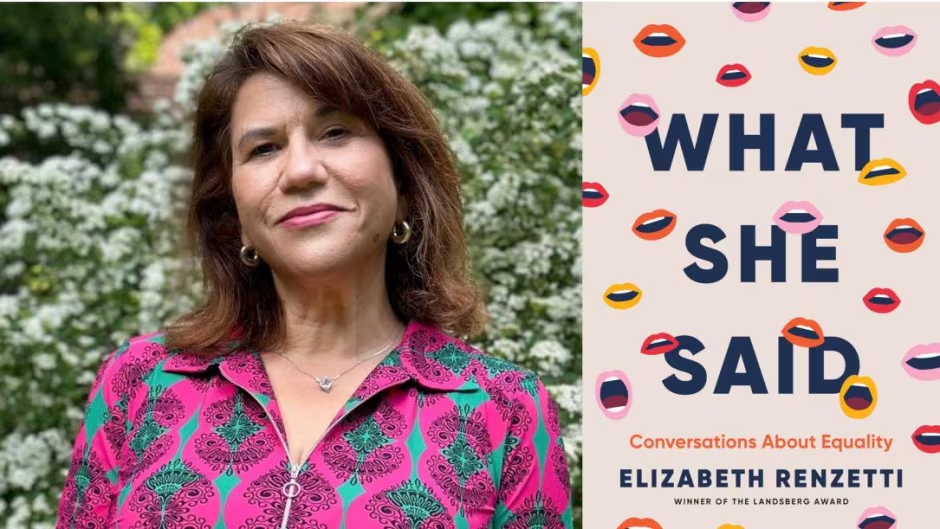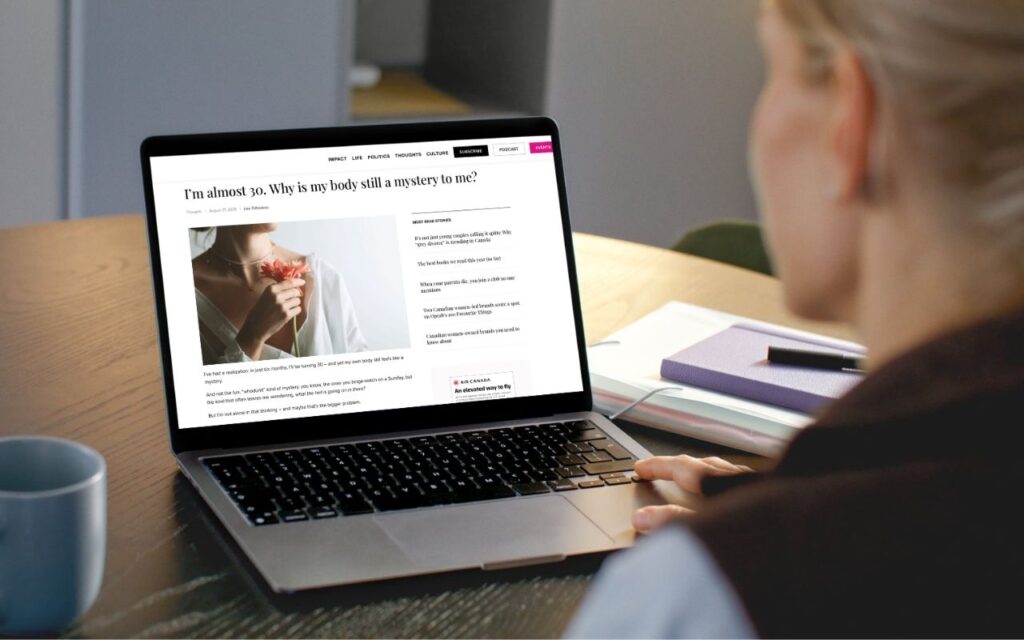
Catherine Clark: We are curious about why you wrote this book now?
Liz Renzetti: It was important to write the book now because, in many ways, women’s rights are being rolled back around the world, which is very alarming. So I wanted to tell this story through my personal history, the reporting I’ve done over the years, and the conversations with women whose stories inspire me. And I wanted to do it with humour, heart, and hope. The book has a lot of hope, which I think is important.
Jennifer Stewart: Liz, there are a lot of people who say, you know, we’ve already broken the glass ceiling and that we’ve achieved equality. In your perspective, why is this a dangerous assumption for us to hold?
Liz Renzetti: If you look at the numbers, we can see that we have not, in any way, achieved equality. You could look at it from any different kind of metric. The pay gap is still huge in Ontario, where I live; it’s at least 13 per cent. As women take time out of their careers to look after children or older people in their lives, they actually have less income than their partners. This becomes a snowball — they have less pension and less wealth accrued when they get older.
Let’s look at political leadership. I mean, how many female premiers do we have in this country? We have one [at the time of recording], and that’s out of 13. You could look at other areas, for example, CEOs — five to six per cent of CEOs in this country are women. So I don’t think you can look at numbers like that and say, “Oh, my goodness, there is a level playing field.” And I should say in all of these fields, the numbers are much worse for women who have been traditionally marginalized. So that is, you know, racialized women, LGBTQ women, disabled women, suffer even worse consequences.
Catherine Clark: I want to pick up on something that you said just a couple of seconds ago, Liz, which was that the book’s focus was on the ability for you to have some personal conversations with women as well. But you made the book deeply personal about yourself, too. You talk about things that you faced as a female journalist, about being assaulted, groped, harassed, verbally abused. You describe an incident where you’re sitting at a dinner with a man beside you and his wife beside him, and his hand moves all the way up your leg. Was it difficult for you to write about these things, or was it actually cathartic?
Liz Renzetti: That’s an excellent question. And I guess in some ways it was cathartic, because, you know, when I became a journalist, we were taught that the “I” pronoun was basically a dirty word, like a swear word, and you never, ever would use I and that personal journalism was somehow debased and lower than “real journalism.” My editor, the wonderful Jenny Bradshaw at McClelland and Stewart, would encourage me and gently nudge me to reveal more and more about myself.
So stories like that one, and I’m glad you say assaulted, because really it was an assault, when I was a young woman at that dinner in New York City, when the publishing executive put his hand basically on my crotch. I did nothing about it, and I stayed silent. What’s interesting here is that silence can protect us — and I would never tell women that they have to speak up. Still, when you do, there is such liberation in it. Other people see your vulnerability, and they connect to it. It’s the thing that readers connect to the most — I’ve discovered that in my career as a journalist — which is the sense that we have all felt pain, we’ve all gone through some of the same things, and people see that shared humanity and it makes them realize that they’re not alone.

Jennifer Stewart: It’s funny you say that, Liz. I wrote an op-ed for the Ottawa Citizen about being sexually assaulted at university, and it was one of the toughest things that I’ve done. But I had an outpouring from women saying, “Thank you for sharing your story. I can finally share mine,” or “I’ve talked to my mom,” or “I’ve shared this with my partner.” So it really is cathartic. Having been abused and going through the #MeToo movement, how did that experience and that kind of cultural wave make you feel?
Liz Renzetti: Well, it’s really interesting because I had the same experience that you did. Once I started writing #MeToo columns and opinions, so many women wrote to me. It was really overwhelming in a way because they would say, “I haven’t been able to tell anyone this, and I don’t necessarily want you to write about it, but I needed to tell someone.” And I thought of all these people sitting there with that pain for so long, for decades. Often, some of these women were in their seventies, or even, you know, older, and they had been sitting with this for so long, unacknowledged. When somebody acknowledges your pain, I think it doesn’t make it go away, but it’s like lancing a boil. It takes some of the poison out.
The other interesting thing about #MeToo is the backlash we’ve seen since then. So there’s definitely been a backlash, and some social scientists do say that the reason we’re seeing, for example, a rise in the manosphere and increasing conservatism among young men is as a reaction to this outpouring, this legitimate outpouring of justified anger that women were experiencing and were finally articulating. So we’ve seen a backlash to it, and we’re living through that right now.
Jennifer Stewart: How do you reconcile that with the #MeToo movement and, I said I wouldn’t get political, but I will: to your point, the uprising of people that are still supporting Trump even though he is a convicted rapist and has made some really misogynistic remarks?
Liz Renzetti: Well, I will say internalized misogyny is a hell of a drug. We know that a lot of white women, in particular, supported him in 2016 and 2020 and probably will support him again, despite the fact that he is, as you say, not just a misogynist but also a racist and really too stupid to be President.
In 2016, I was in Florida, reporting on the presidential election. We all, of course, thought that Hillary Clinton was going to become President because she was obviously the better-qualified candidate. And I talked to some women Trump supporters, and I would say to them, “There are at least two dozen women who have credibly accused him of assaulting them. What do you think about that?” And they all said, “He would never do that. He has Melania at home, and she’s so beautiful. How would he ever do that to her?” I was just flabbergasted. But, if you’re told your whole life that you’re lesser than others, not as smart, not as qualified, you might tend to believe it, and you might actually buy the snake oil sold by somebody like Trump. And let’s not forget his running mate, JD Vance, who thinks that women who don’t have children are, in some way, you know, morally deformed, which is just so horrifying I can’t even really begin to grapple with it.
They are calling this the most gendered election ever. In terms of the polls, women are going to support Kamala Harris in much greater numbers than they support Trump. However, we are still going to have a number of women voting for Trump. I think that’s because the patriarchy teaches us lessons that we internalize deep down and don’t even realize are harming us.
Catherine Clark: One of the huge concerns, though, of course, is that this is not just a situation that we’re seeing south of the Canadian border; it’s a global situation where we’re really seeing the general erosion of women’s rights. I mean, we now look at Afghanistan and see that women are being penalized for even speaking — not speaking their minds, but actually talking.
On the flip side of that, Liz, I’ve been following, and I know Jen has too, this incredible situation in France where Gisele Pelicot, a French housewife, was raped by over 50 men with the explicit consent of her husband. And she has insisted on a public trial because she said, “I have nothing to be ashamed of. They are the ones who bear the shame.” And she has had incredible support; people in the streets support her. So there’s this dichotomy between how we’re relating to women.
On the one hand, we’re saying, “We’re not going to take the shame and the fear and the guilt anymore.” On the other hand, we’re silencing women or eroding their reproductive rights. It’s a bizarre time. How do you reconcile that?
Liz Renzetti: It is a really weird time, I totally agree. And I think that there are heroic women around the world, women like Gisele, women like those who testified against Peter Nygard, who was convicted of rape, or the women who came forward to talk about the allegations against Diddy, for example. So we have these individual cases that are so galvanizing and make you feel really wonderful; as Gisele said, “The shame has to be reversed.” But those are individuals, and we must look at the systems that oppress us.
So, for example, in France, you still have a country where there is an incredibly high rate of femicide, and women don’t necessarily get justice when they go to the court system. We have to look at dismantling the systems. Patriarchy exists as this kind of invisible force that has been built over millennia to protect, uphold, and further the rights of one gender over another. We have to understand that we live in these invisible systems, and it’s going to take a lot to dismantle them, and we are all going to have to work together to do it. I think we can applaud the individual bravery and achievements of certain women while understanding that they are the anomaly in these systems that still continue to oppress us.
Catherine Clark: In the book, you talk about your mom and the situation in which you grew up. It was not always ideal. Can you tell us how your childhood informed your reporting on issues affecting women?
Liz Renzetti: Yes, absolutely. I grew up in a household where there was violence, and my father was abusive toward my mother. He wasn’t a monster by any stretch of the imagination; he was a wonderful father in many ways. But it was an extremely dysfunctional household to grow up in. One person you love is harming another person you love, and that is a terrible thing for a child to see. We have really no idea of how vast the scope of domestic and intimate partner violence, family violence is in this country because it is so under-reported and so stigmatized.
I think if I had grown up in a less chaotic household, I probably would have ended up being like a drama critic or, you know, a science reporter or something. But instead, I was drawn to this field because I knew personally, intimately, what happens to women when they’re trapped in cycles of violence, and how it can harm not just them, but their whole communities and their children as well.
Jennifer Stewart: Liz, let’s talk about pay equity. You know, women, it’s not a big shock, are still paid less than men. In fact, you wrote about the fact that you were paid less than your husband, who essentially did the same job as you. What advice do you have for women who want to ask for a raise or demand equal pay?
Liz Renzetti: I feel sort of slightly guilty every time I talk about it, because my husband, I have to say, he is so wonderful, like he’s a better parent than I am in many ways, and he’s just terrific, he’s just the best man. But again, we come back to this idea of the individual versus the system. I also talk in the book about how I sat down with a bunch of young women journalists at one point, and we were talking about pay, and I said, “Have you asked for a raise lately?” and they all looked at me and said, “Well, we didn’t know we could ask for raises because we’re in a union shop.” And I said, “Of course, you can ask for a raise.”
There’s good evidence to show that sometimes when women ask for raises, they’re actually penalized because they’re seen as being too big for their britches or obnoxious. What we have to do is work together through, I would say, organized labour and collective bargaining and things like that, to ensure that we have equal pay agreements, for example, so that we have pay equity within companies and within industries. The other thing I think we need to do is there’s such gendering of professions, right? So if you look at, for example, personal support workers or early childhood educators, it’s almost entirely women. And these fields made up of women are deeply undervalued, they get paid so little, they have precarious work, they don’t get sick days often, and things like that.
So I think we have to try to de-gender professions, draw men into occupations that are traditionally female, and draw women into professions that are usually male. It’ll take a long time, but that is one way that we will start to see equity in income.





